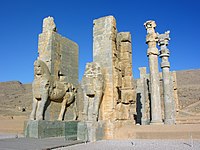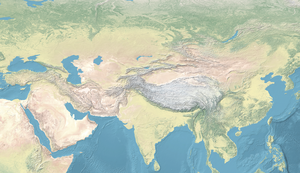Proto-Elamite (period)

The Proto-Elamite period, also known as Susa III, is a chronological era in the ancient history of the area of Elam, dating from c. 3100 BC to 2700 BC.[1][3] In archaeological terms this corresponds to the late Banesh period. Proto-Elamite sites are recognized as the oldest civilization in the territory of present-day Iran. The Proto-Elamite script is an Early Bronze Age writing system briefly in use before the introduction of Elamite cuneiform.
History
Background
During the period 8000–3700 BC, the Fertile Crescent witnessed the spread of small settlements supported by agricultural surplus. Geometric tokens emerged to be used to manage stewardship of this surplus. The earliest tokens now known are those from two sites in the Zagros region of Iran: Tepe Asiab and Ganj-i-Dareh Tepe.
The Mesopotamian civilization emerged during the period 3700–2900 BC amid the development of technological innovations such as the plough, sailing boats, and copper metal working. Clay tablets with pictographic characters appeared in this period to record commercial transactions performed by the temples.
Proto-Elamite sites
The most important Proto-Elamite sites are Susa and Anshan. Another important site is Tepe Sialk, where the only remaining Proto-Elamite ziggurat is still seen. Texts in the undeciphered Proto-Elamite script found in Susa are dated to this period as well as at Tepe Sofalin and Tepe Yahya. It was originally assumed that the Proto-Elamites were in fact Elamites (Elamite speakers), because of cultural similarities (for example, the building of ziggurats), and because no large-scale migration to this area seems to have occurred between the Proto-Elamite period and the later Elamites. As Proto-Elamite writing has now been found over a wider area that is less certain.
Proto-Elamite pottery dating back to the last half of the 5th millennium BC has been found in Tepe Sialk, where Proto-Elamite writing, the first form of writing in Iran, has been found on tablets of this date. The first cylinder seals come from the Proto-Elamite period, as well.[4]
-
Striding figure, Proto-Elamite or Mesopotamian (3000–2800 BC).[5]
-
Kneeling Bull with Vessel. Kneeling bull holding a spouted vessel, Proto-Elamite period (3100–2900 BC). Metropolitan Museum of Art[6]
-
The Proto-Elamite Guennol Lioness, c. 3000–2800 BC, 3.5 inches high
-
Chlorite vessel with mythological scenes, Early Dynastic III, 2600–2300 BCE; found in Ur but probably made in Iran
Proto-Elamite cylinder seals
Proto-Elamite seals follow the seals of the Uruk period, with which they share many stylistic elements, but display more individuality and a more lively rendering.[7]
-
Susa III/ Proto-Elamite cylinder seal, 3150–2800 BC. Louvre Museum, reference Sb 1484
-
Susa III/ Proto-Elamite cylinder seal 3150–2800 BC Louvre Museum Sb 2675
-
Susa III/ Proto-Elamite cylinder seal 3150–2800 BC Mythological being on a boat Louvre Museum Sb 6379
-
Proto-Elamite seal impression: combat between man-bull and animals
See also
References
- ^ a b Louvre, Musée du (1992). The Royal City of Susa: Ancient Near Eastern Treasures in the Louvre. Metropolitan Museum of Art. ISBN 9780870996511.
- ^ "Site officiel du musée du Louvre". cartelfr.louvre.fr.
- ^ Álvarez-Mon, Javier (2020). The Art of Elam CA. 4200–525 BC. Routledge. p. 120. ISBN 978-1-000-03485-1.
- ^ "The Habib Anavian Collection: Iranian Art from the 5th Millennium B.C. to the 7th Century A.D." website of the Anavian Gallery, New York. Retrieved 22 October 2012.
- ^ "Statuette of a Striding Figure". The Art Institute of Chicago.
- ^ "Kneeling bull holding a spouted vessel, ca. 3100–2900 B.C. Proto-Elamite". www.metmuseum.org.
- ^ The Royal City of Susa: Ancient Near Eastern Treasures in the Louvre. Metropolitan Museum of Art. 1992. p. 70. ISBN 9780870996511.
Further reading
- Alden, J.R., Minc, L., "Itinerant potters and the transmission of ceramic technologies and styles during the Proto-Elamite period in Iran", J. Archaeol. Sci. Rep. 7, pp. 863–876, 2016
- Amiet, P., "Il y a 5000 ans les elamites inventaient l’ecriture", Archeologia 12, pp. 16–23, 1966
- Aruz, Joan, "Power and Protection: A Little Proto-Elamite Silver Bull Pendant", Leaving No Stones Unturned: Essays on the Ancient Near East and Egypt in Honor of Donald P. Hansen, edited by Erica Ehrenberg, University Park, USA: Penn State University Press, pp. 1–14, 2002
- L. Le Breton, "The Early Periods at Susa: Mesopotamian Relations", Iraq 19, 79–124, 1957
- Brice W.C., "The Writing System of the Proto-Elamite Account Tablets of Susa," Bulletin of the John Rylands Library 45, pp. 15–39, 1962
- [1] Jacob L. Dahl, "The proto-Elamite seal MDP 16, pl. XII fig. 198", in Cuneiform Digital Library Notes, CDLN 2014:1, 2014
- [2] Jacob L. Dahl, "New and old joins in the Louvre proto-Elamite tablet collection", in Cuneiform Digital Library Notes, CDLN 2012:6, 2012
- Dahl, Jacob L, "Animal Husbandry in Susa during the Proto-Elamite Period" SMEA, vol.47, pp. 81–134, 2005
- [3]Peter Damerow, "The Origins of Writing as a Problem of Historical Epistemology", Invited lecture at the Symposium on the Multiple Origins of Writing: Image, Symbol, and Script, University of Pennsylvania, Center for Ancient Studies March 26–27, 1999
- Dittmann, R., "Seals, Sealings and Tablets: Thoughts on the Changing Patterns of Administrative Control from the Late-Uruk to Proto-Elamite Period at Susa", Pp. 332–366 in Ğamdat Nasr. Period or Regional Style? Papers given at a Symposium held in Tübingen November 1983. Beihefte zum Tubinger Atlas des Vorderen Orients. Reihe B 62, eds.U. Finkbeiner and W. Rollig. Wiesbaden: Reichert Verlag, 1986
- [4] Englund, R.K, "The Proto-Elamite Script," in: Peter Daniels and William Bright, eds. The World's Writing Systems (1996). New York/Oxford, pp. 160–164, 1996
- Robert H. Dyson, "Early Work on the Acropolis at Susa. The Beginning of Prehistory in Iraq and Iran", Expedition 10/4, pp. 21–34, 1968
- [5]Hansen, Donald, et al., "A Proto-Elamite Silver Figurine in the Metropolitan Museum of Art", Metropolitan Museum Journal, vol. 3, pp. 5–26, 1970
- [6] Laura F. Hawkins, "A New Edition of the Proto-Elamite Text MDP 17", Cuneiform Digital Library Journal, CDLJ 2015:001, 2015
- Khosravi, Shokouh, et al, "Tapeh Tyalineh: a proto-Elamite administrative institution on the Great Khorasan Road, Kermanshah, Western Iran", Journal of the Royal Asiatic Society, pp. 1–28, 2023
- A. Le Brun, "Recherches stratigraphiques a l’acropole de Suse, 1969–1971", in Cahiers de la Délégation archaéologique Française en Iran 1, (CahDAFI 1), Paris, pp. 163 – 216, 1971
- Daniel T. Potts, "The Archaeology of Elam", Cambridge, UK, 1999
- [7] Saeedi, Sepideh, "Proto-Elamite Communities under the Magnifying Glass", in: Abar, Aydin et al. (Hrsg.): Pearls, Politics and Pistachios: Essays in Anthropology and Memories on the Occasion of Susan Pollock's 65th Birthday, Heidelberg: Propylaeum, pp. 61–87, 2021
- Sax, M., and A. P. Middleton, "The Use of Volcanic Tuff as a Raw Material for Proto-Elamite Cylinder Seals", Iran, vol. 27, pp. 121–23, 1989
- Scheil, V., "Documents archaïques en écriture proto-élamite", Revue Biblique (1892–1940), vol. 2, no. 3, pp. 372–76, 1905
- V. Scheil, "Textes de Comptabilité Proto-Élamites", MDP 17, Paris, 1923
- V. Scheil, "Textes de Comptabilité Proto-Élamites", MDP 26, Paris, 1935
- [8] Francois Vallat, "The Most Ancient Scripts of Iran: The Current Situation", World Archaeology, vol. 17, no. 3, Early Writing Systems, pp. 335–347, Feb. 1986
External links
| History of Iran |
|---|
 |
|
Timeline |
- Proto-Elamite tablets online at CDLI
- Art of the Bronze Age: Southeastern Iran, Western Central Asia, and the Indus Valley, an exhibition catalog from The Metropolitan Museum of Art (fully available online as PDF), which contains material on Proto-Elamite culture

![Striding figure, Proto-Elamite or Mesopotamian (3000–2800 BC).[5]](http://upload.wikimedia.org/wikipedia/commons/thumb/0/0a/Striding_Figure_Proto-Elamite_period.jpg/135px-Striding_Figure_Proto-Elamite_period.jpg)
![Kneeling Bull with Vessel. Kneeling bull holding a spouted vessel, Proto-Elamite period (3100–2900 BC). Metropolitan Museum of Art[6]](http://upload.wikimedia.org/wikipedia/commons/thumb/f/f5/Proto-Elamite_kneeling_bull_holding_a_spouted_vessel.jpg/123px-Proto-Elamite_kneeling_bull_holding_a_spouted_vessel.jpg)


















